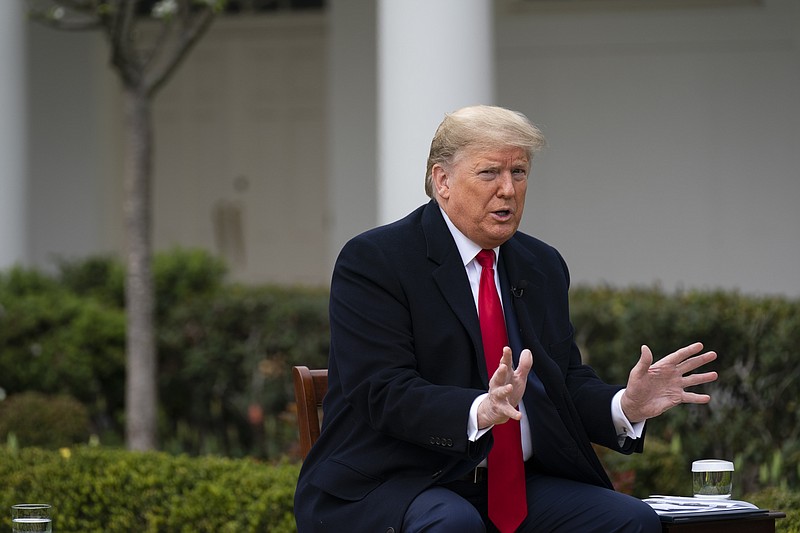One could sympathize with President Donald Trump as he sat in his overcoat in the White House Rose Garden, tulips and the first flowers of spring blooming in the background.
It wasn't supposed to be this way.
Spring is a time of renewal, of new life, of the weather changing from cold to warm, of people moving from inside to outside, of businesses moving from the doldrums of winter to new incentives for sales.
And Trump was being told it was a time for Americans to do just the opposite - to socially isolate, to shelter in place, to have businesses shut down.
And whether he pulled the date out of the cool spring air or had been considering it for a while, he said it during a televised Fox News virtual town hall Wednesday. He hoped the country could begin pulling out of its stay-at-home inertia by Easter Sunday.
Easter, the day when Christians celebrate the resurrected Christ, also may be seen by the faithful as a time of new beginnings. The president may have had that in mind when he mentioned the holiday, then a mere 19 days away.
Nineteen days to end a pandemic, 19 days to flatten the curve, 19 days to treat the sick, 19 days to see new coronavirus cases fade away.
If the goal for the virus is to fall flat on its face and die out because it has nowhere to go, social distancing is the key. In all likelihood, it won't have time to do that in 19 days, even if people practiced their very best isolation. It took months, after all, for the virus to take off in the United States.
We hope as we go forward that Trump admits that Easter was just a goal, that he was being hopeful in a nation of hopeful people, in a nation not used to inaction, in a nation not used to not getting up and going.
Fortunately, there were signs even the evening of the day on which Trump made his pronouncement that he would do so. White House coronavirus task force member Dr. Anthony Fauci said on a Fox News program that the president's goal was "aspirational," that he and his task force were on the same page about matters and that a timeline would need to be "flexible."
"The president clearly listens," he said. "I mean, he has this aspirational goal of hoping that we might be able to do it by a certain date. We talked to him about that. We say we need to be flexible. He realizes that and he accepts that. I mean, he doesn't want to give up his aspirational goal, but he's flexible enough to say, 'OK, let's look at it on a day by day basis,' we say, and we will give him data to inform that decision."
Fauci, head of the National Institute of Allergy and Infectious Diseases, made other statements last week that gave us comfort that Trump - no matter what he sometimes says - actually takes very seriously what his best medical and scientific advisers tell him.
In fact, the disease specialist even said he'd never given the president his best advice about the coronavirus that he didn't take it.
"[H]e's been very flexible about it," Fauci said, "even though it looks like he's made this absolute decision on something. He does have an open mind about it."
Trump won't say so, but he's clearly worried about the economy tanking and that being held against him in the November election. He figures - and there's every reason to believe it - that if the need for isolation were short that the economy would come roaring back.
Just before the coronavirus began descending on the U.S., after all, he and his economic advisers had just gotten the astounding February job numbers. The country had added 273,000 jobs, almost 100,000 more than expected. The January job gains had been revised upward by nearly 50,000. And the unemployment rate had reached the same 3.5% 50-year low that it hit in December.
However, Trump likely believes the longer many businesses are stilled, the worse the economy will be and the more he will be blamed, though the coronavirus is not of his making.
And no doubt, the U.S. economy is going to take a hit - a strong one - from this pandemic, but some indications are the public understands this isn't the president's fault.
Trump's most recent job approval rating in the latest Gallup survey matched the highest in his presidency, 49% - up from 44% in the same survey earlier this month. The survey also indicated 60% of voters approved of the job he is doing to address the coronavirus.
We hope those numbers - with strong advice from his task force team - will convince him to suggest Americans stay in place not just until Easter but until such time as it appears the worst is behind us. And if people do just that, the worst may be behind us more quickly than we expect.
